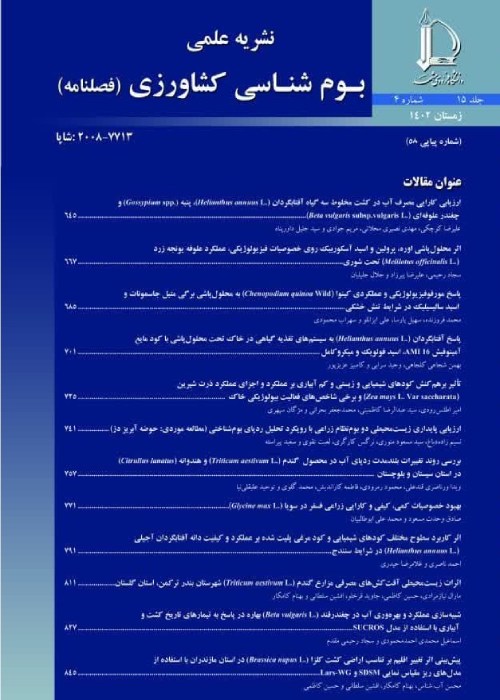Evaluation the Effect of Inoculation Time of Plant Growth Promoting Rhizobacteira on Macroelements Uptake and Yield of Tomato (Solanum lycopersicum L)
Poor soil fertility is one of the main problems that limit the successful agricultural production and the global economy. Therefore, it is necessary to regulate or correct poor soil fertility, by providing vital nutrients for optimum plant growth. Improving soil fertility through fertilizer can increase crop production per unit area. But excess use of chemical fertilizers, in addition to disrupting the biological balance, nutrition and physical properties of soils, causes to environmental hazards, pollution of surface and ground water resources. Biofertilizers can reinforcement soil fertility and provide the required plant nutrition with respect of sustainable agriculture. These organisms not only stimulate the growth of plants by helping the specific elements, but also reduce disease, improve soil structure and consequently increase the quantity and quality of their product. Pseudomonas, Bacillus, Azospirillum, Azotobater and Rhizobium are the most important plant growth promoting rhizobacteria (PGPR). Several mechanisms have been suggested by which PGPR can promote plant growth, including auxins, enhancing stress resistance, asymbiotic N2 fixation, solubilization of inorganic phosphate, mineralization of organic phosphate or other nutrients and inhibiting the growth of pathogenic microorganisms.
In order to determine the best time of application of Pseudomonas ssp. strains (sp.S10-1 + sp.S19-1 , sp.S14-3 + sp.S19-1 , sp.S19-1+ sp.S21-1) as a plant growth promoting rhizobacteria on growth and nutritional characteristics of tomato (Lycopersicon esculentum Mill cv. Super Chief) an experiment based on randomized complete block designed with 8 treatments and 3 replications in field of research station Khalatpoushan Faculty of Agriculture, Tabriz University. Treatments used in this experiment included : 1- Inoculation with Pseudomonas bacteria sp.S10-1 + Pseudomonas sp.S19-1 during seed planting in the nursery, 2- Inoculation with Pseudomonas bacteria sp.S14-3+Pseudomonas sp.S19-1 during seed planting in the nursery, 3- Inoculation with Pseudomonas bacteria sp.S19-1+Pseudomonas sp.S21-1 during seed planting in the nursery, 4- Inoculation with Pseudomonas bacteria sp.S10-1 + Pseudomonas sp.S19-1 during planting seedlings in the main land 5- Inoculation with Pseudomonas bacteria sp.S14-3+Pseudomonas sp.S19-1 during planting seedlings in the main land 6- Inoculation with Pseudomonas bacteria sp.S19-1+Pseudomonas sp.S21-1 during planting seedlings in the main land 7- control treatment without bacteria inoculation 8- fertilizer treatment (according to the soil test).
The result showed that the effects of the timing of bacteria inoculation on tomato characters such as yield, fruit size and the percentage of marketable fruit, percentage of K, vitamin C is meaningful and the highest amount of yield, fruit size, the percentage of marketable fruit, percentage of K in fruit was in T2 treatment concluded (4130.9 g m-2 and 60.22 and 31.18 and 4.7 mg g-1) respectively and the highest amounts of the vitamin C in T3 treatment as 7.02 mg 100g-1 fruit weight. However the other measured traits, including percentage of percentage of N, P in plant leaves, length and diameter of fruit and percentage of the dry matter did not affected by the timing of bacteria inoculation. According to the result timing of bacteria inoculation has a significant effect on yield and quality improvement of tomato.
The results of this research showed that tomato seed inoculation with the Pseudomonas ssp. strains including (sp.S10-1 + sp.S19-1 , sp.S14-3 + sp.S19-1 , sp.S19-1+ sp.S21-1) compared with soil inoculation of Pseudomonas ssp. strains significantly increased yield, vitamin C, potassium content of fruit and percentage of marketable fruit. However, the increase in the amount of potassium, phosphorous and nitrogen concentration in plant leaves was not significant. In addition to increasing the yield and quality of tomato, tomato seed inoculation with the Pseudomonas ssp. strains compared with soil inoculation with the strains Pseudomonas is considered a better method.
- حق عضویت دریافتی صرف حمایت از نشریات عضو و نگهداری، تکمیل و توسعه مگیران میشود.
- پرداخت حق اشتراک و دانلود مقالات اجازه بازنشر آن در سایر رسانههای چاپی و دیجیتال را به کاربر نمیدهد.


